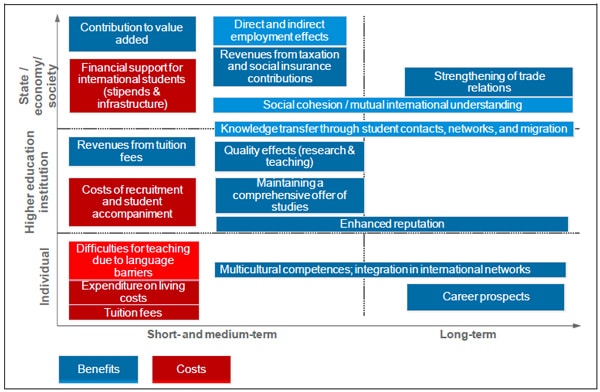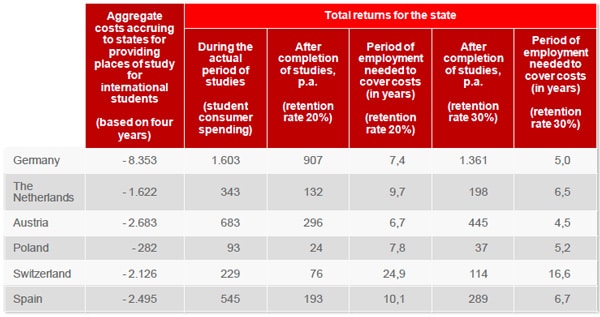New research explores economic impact of international students on host countries
An ambitious new study aims to explore the direct cost-benefit relationships of international students as they pertain to host institutions and host countries. The study, The financial impact of cross-border student mobility on the economy of the host country, by the German Academic Exchange Service (DAAD), reveals that the tuition, immigration, and taxation policies of the host country are huge factors affecting the economic benefits created by international students. The study found a large range of economic impacts from international students across the six European countries involved. It also revealed that in some countries, it can take much longer for the economic benefits of international students to outweigh the costs of hosting them. Perhaps most interestingly, the German research highlights how important retaining international students post-graduation can be to the host country economy.
The study’s methodology
The study examines Germany, the Netherlands, Austria, Poland, Switzerland and Spain, and “employs a model for calculating the short-and long-term financial and economic effects of international student mobility developed on the basis of an analysis of the available national and international literature.” Some of its most interesting features include:
- A breakdown of what constitutes a net economic benefit (e.g., student spending, job creation, and taxation revenues);
- An analysis of various factors influencing economic benefits (e.g., tuition, immigration, and taxation policies);
- A look at benefits prompted not just during an international student’s study period but also post-graduation (assuming the student remains in the host country to work);
- A calculation of how long it would take each country participating in the study to realise benefits from international students more substantial than the costs incurred in hosting the students.

As the figure above suggests, the study is largely focused on sorting out direct, measurable economic impacts. A related commentary from ScienceGuide is careful to highlight that, “On top of these economics effects, there are other effects that are harder to express in economic terms. Increased student mobility boosts cross-border knowledge, benefitting both countries. Student also acquire multicultural competences which on the level of the individual are valuable for future careers, and on the societal level contribute towards understanding and breaking down prejudices between peoples. Moreover, cross-border student mobility facilitates the formation of international networks, which can in the long term lead to intensified economic relations among participating countries, the researchers state.”
Examples of how differing economic structures affect benefits realised from international students
Cost of livingThe study notes that of the participating countries, Switzerland has the highest cost of living and that as a result, "the macro-economic effects on value creation and employment depend on the amounts international students have to spend to cover their living expenses." The study adds:
"In Switzerland, due to the high living costs there, students spend around €19,500 per year. The cost of living is lowest in Poland, where student expenditure amounts to €4,800. In the other researched countries, the money students spend on accommodation and consumption ranges from €9,000 in Spain to €11,400 in the Netherlands.”Taxation revenues
The tax on income that international student graduates pay in a host country when they stay to work there also contributes to the country’s economic benefits. Again, these differ widely: “In countries like Germany and Austria with relatively high average levels of income tax, the annual effect per head at around €22,700 and €25,000 respectively is correspondingly higher than in the other countries researched [for example, Poland came in at just €3,800 per head].” Tuition policies When the state pays for most of what it takes to accommodate international students (as opposed, for example, to an institution’s charging differential tuition for international students to offset the cost of supporting them), this falls into the category of a cost, rather than a benefit. Consider the different costs incurred by Spain, for example, compared to the other countries:
“State expenditure per place of study varies between €2,900 in Poland and €22,500 in Switzerland. At around €11,900, Germany is mid-field. Austria and the Netherlands, at €11,200 and €10,500 respectively, have similarly high state expenditure. In Spain the state expenditure on higher education funding is lower, at around €8,000.”
The cost to a national economy of hosting international students of course goes down in countries like the US, Canada, UK, and Australia, where international students pay differential fees designed to recover the full costs of the student’s programme of study. While these countries were not part of the German study, we can reasonably imagine that the economic benefit of international students for such host countries is considerably higher given the greater tuition differentials involved.
Benefits end up outweighing costs … but it can take time
Cost of living, taxation policies, and tuition policies are just some of the factors revealed by the study to influence the relationship between the costs and benefits of international students in different countries. The interplay between costs and benefits – and how much the latter win out over time – is complex and the study uses a variety of calculations to analyse them. But overall, the main points arising from the research are that:
- International students do end up producing a net positive economic benefit for a host country, and this is distributed through the economy differently depending on how the economy functions.
- Much of the eventual benefit is realised over time – long-term benefits, especially caused by an international student’s remaining in the host country to work after graduation, stand to be much higher than the short-term economic impact of the student’s study period.
The German Academic Exchange Service study explicitly states:
“The annual level of long-term returns depends entirely on the number of international students who, once they have graduated, choose to remain in a host country and pursue gainful employment.”
This is because of the creation of jobs and new spending, as well as revenues from taxation, that international graduates generate by remaining in the country to work.















